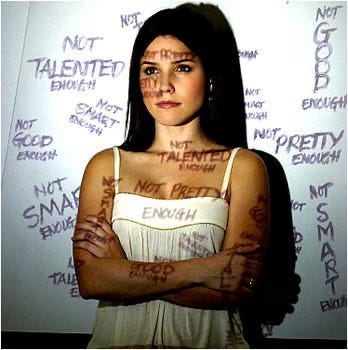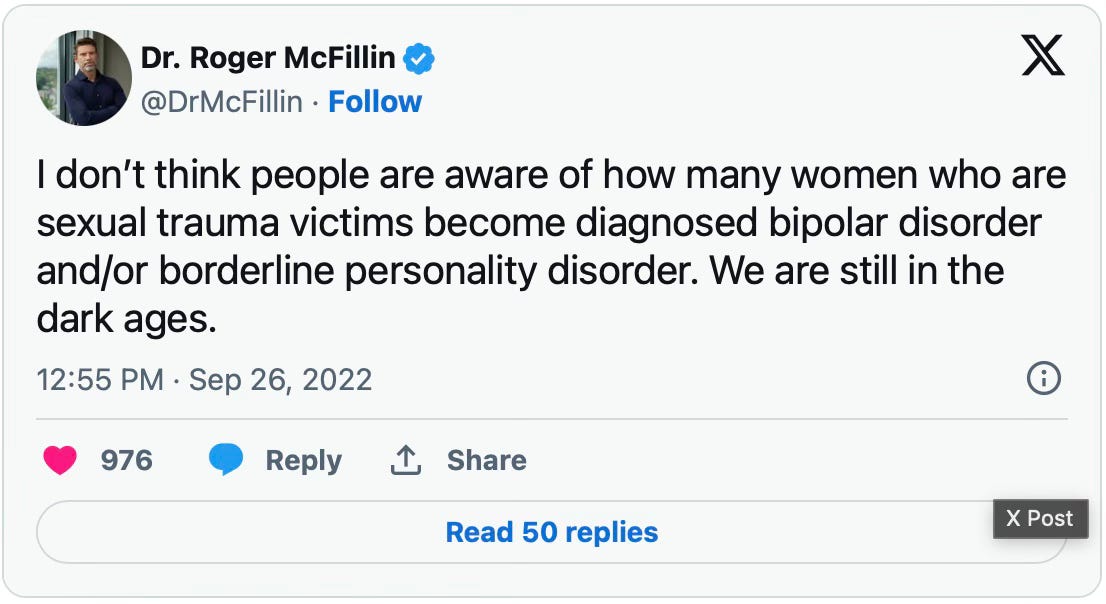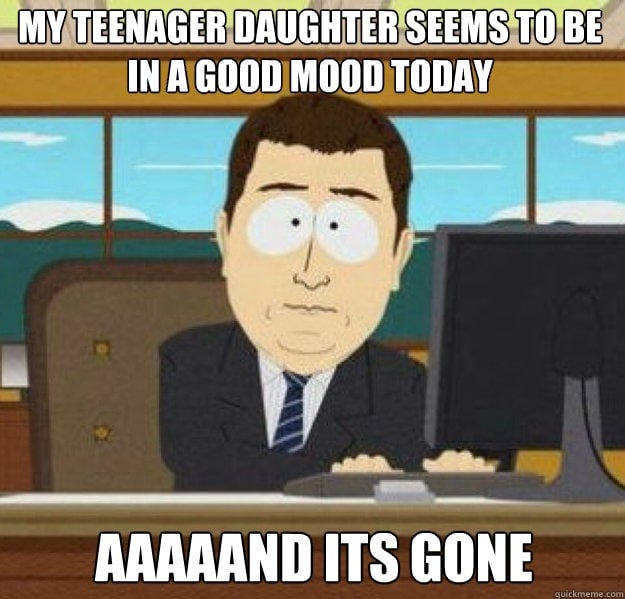What the Hell is Society Doing to Adolescent Girls?
“It is no measure of health to be well adjusted to a profoundly sick society”
Jiddu Krishnamurti
WTF are we doing to young girls?
One specific evening remains etched vividly in my mind, emblematic of the distressing trends I am witnessing in clinical practice. (*Details have been altered to protect privacy.)
It started with a new evaluation of a 30 year old woman who had been taking 6 psychiatric drugs. She had experienced significant weight gain, was horribly depressed, lethargic and could not remember the last time she had a deep and restful sleep. I traced the initial antidepressant prescription to age 17 after her father unexpectedly died.
Envisioning a grieving young girl navigating the profound pain of a significant loss, I found myself simmering with anger. Despite this, I maintained composure, explored the details of her diagnoses and prescription history over the years. Expressing genuine concern about the potential impact of these drugs on her health and well-being, she seemed relieved — as though it were the first time someone had acknowledged that the drugs might be part of the problem. Indeed, it was.
A challenging way to start the evening, but not out of the ordinary. This had become standard mental health care.
The subsequent client, a 22-year-old woman walked into my office, tears streaming down her face over a one-pound weight gain. Her tumultuous journey included a traumatic sexual assault at 19, leading to a history of substance abuse and a severe eating disorder. In a poignant admission, she expressed, "The only thing I had going for me was that I was skinny." The treatment for anorexia seemed to strip away her last semblance of control and source of self-esteem.
She learned at a very young age that her value was tied to her attractiveness and sex appeal. Her cell phone became a constant companion throughout crucial developmental years, and she eagerly shared her life on Instagram. She developed an addiction to "likes" and, as a teenager, persisted in pushing boundaries by posting provocative photos.
She acknowledged having uncontrolled access to the internet since the age of 12 and by the time she was 14 she was watching pornography and interacting with older men online.
Experiencing her 1-pound weight gain as a catastrophic event, I felt a wave of hopelessness, emptiness, and profound sadness wash over me. Acknowledging these emotions, I paused to observe them before redirecting my focus back to the task at hand. I reminded myself to control what I could in that moment – my role was to aid this young lady in restoring her health and helping her navigate through this discomfort.
As a father of two adolescent girls I found the anger and resentment building even further. WTF have we done?
The incident triggered a recollection of a social media post I came across earlier in the day. The post pondered the accessibility of free pornography juxtaposed against the widespread prescription of synthetic hormonal birth control (endocrine disruptors), antidepressants and the marketing of alcohol. The irony was emphasized by the fact that, in many states, raw milk is illegal.
Spinning after that session, I needed a moment to regroup. "They want us sick and dependent," I thought. Let me share that on Twitter. Now I feel better.
On to the next session.
My next client, a teenager, found herself prescribed Lexapro after a routine pediatrician visit. Influenced by friends who were taking the widely prescribed drug and dubbed themselves "Lexaho's," she felt compelled to join their ranks.
In a bid to secure the prescription, she admitted to exaggerating on a self-report depression screening, leading to a referral for "depression and suicidal thinking”. Ironically, she reported that being “normal” placed her at a social disadvantage and desired to be “depressed.”
"Is anyone aware that this is happening?" I wondered. It wasn't the first time this concern had surfaced in my sessions. I felt compelled to share this on Twitter.
Time to refocus.
Her refreshing candor revealed a teenager who was undoubtedly not depressed. However, my concern heightened considering that Lexapro has shown a six-fold increase in the risk of suicidal thinking compared to a placebo.
I met with her and her mother to share this information. The mother, relieved yet disturbed by the doctor's laissez-faire attitude towards such a potent drug, expressed her anger. In that moment, a sense of order was restored, and I felt a slight relief.
Until the next session.
The last session of the evening featured another young woman recently diagnosed with bipolar disorder following a psychiatric hospitalization. She was prescribed a cocktail of three psychiatric drugs, along with a PRN for anxiety on which she had already become dependent.
Her troubled past included high school abuse by her stepfather, prompting her to run away at 17. Subsequent relationships with abusive and controlling men led to hospitalization for self-injury and suicidal ideation, ultimately culminating in the diagnosis of bipolar disorder.
She perceived herself as broken, unable to make sense of her emotions. Labeled as "too much," "too emotional," and “excessively dramatic”, she struggled to acknowledge the validity of her reactions in light of her history. Consequently, within the mental health system, her emotional struggles were now framed and treated as manifestations of mental illness.
The casual acceptance of teenage girls' erratic mood states in pop culture has become so widespread that we barely give it a second thought. But should we? Is this volatility a natural part of adolescence, or are we turning a blind eye to the potential consequences of modern society on the mental health of young girls?
Women are more than twice as likely than men to use antidepressants. The suicide rate among Americans ages 10 to 24 increased by 56% between 2007 and 2017, according to the Centers for Disease Control and Prevention. The mental health crisis in the U.S. is most prominently impacting girls ages 13-25. There was a 43.6% increase in emergency room visits for suicidal ideation, suicide attempts, or self-injury and a 120.4% increase in visits for eating disorders in 2021-2022.
Y’all think this is normal?
Let's pause to consider the experiences of a Generation Z female. It's highly probable that she spends 6-10 hours a day on her phone, a habit established since the age of 12.
Females, in general, have a heightened need for social connection compared to males, leading them to engage and explore socially through storytelling and shared experiences. Traditionally, this manifested in rumor spreading, gossip, and discussions about other friends.
However, in the digital age, these interactions are now documented on texts or social media apps, adding a new layer to the dynamics of social connection. Cyber bullying is rampant in a way that has never been experienced previously.
Young girls are frequently exposed to over-sexualized content and inundated with sexualized and provocative images online. Many of these visuals are manipulated through techniques like photoshopping or AI generation, contributing to the creation of unrealistic standards of female beauty. Consequently, this exposure fosters a profound dissatisfaction with their bodies and significantly impacts their self-esteem, perpetuating harmful societal expectations around appearance.
Instagram likes are now akin to a popularity contest that is driven by provocative content. This is driving an unhealthy dependence on this app in particular.
As they experience the expected and normal body dissatisfaction from constant exposure to this fake world, they are brainwashed into believing they may be experiencing “gender dysphoria” and are told:
“Gender isn't about someone's anatomy, it is about who they know them self to be. There are many different gender identities, including male, female, transgender, gender neutral, non-binary, agender, pangender, genderqueer, two-spirit, third gender, and all, none or a combination of these.” -Teentalk.ca
Traditionally, Gender Dysphoria affected only a minuscule 0.01% of the population, primarily boys. However, in the United States, over the past decade, rates have surged significantly, with some studies indicating that nearly 2% of all high school students now identify as transgender. This unprecedented increase is driven by what's termed "rapid onset gender dysphoria" in adolescent girls. It's undeniably a social contagion effect, influenced by the intersection of developmental and cultural factors.
While identity development and disturbance are typical during this developmental phase, the depiction of gender neutrality introduces additional layers of confusion.
What is normal?
Moreover, reflecting on the earlier session, the societal stigma attached to being "normal" adds to the struggle. In contemporary American culture, innate privilege is often viewed as the ultimate transgression, further complicating the landscape of identity formation for young girls.
A portion of adolescent girls may be prescribed hormonal birth control for various conditions, a practice known to deplete essential vitamins and minerals crucial for thyroid function. Birth control pills introduce high doses of synthetic estrogen and progesterone, shutting down the production of natural hormones, preventing ovulation, and thinning the uterine lining. This process can lead to hormonal imbalances like estrogen dominance and strip the body of vital nutrients such as folate, B12, and B6 vitamins. Deficiencies in these nutrients may result in conditions like anemia, depression, and other serious health concerns.
They are exposed to over sexualized adolescent males raised on free pornography sites. At the very least, they become sex objects and are aggressively pursued for provocative pictures. 1 out of 9 girls under the age of 18 will experience sexual abuse or assault. Females ages 16-19 are 4 times more likely than the general population to be victims of rape, attempted rape, or sexual assault.
Victims of sexual exploitation, assault and violence are labeled with ADHD, Bipolar Disorder and Borderline Personality Disorder and drugged by the psychiatric industrial complex.
Amidst all these challenges, pop culture and the modern medical industrial complex often deliver a clear message to young girls: if you feel anxious or depressed, it might indicate a serious brain chemical imbalance. This narrative suggests that their emotional reactions and challenges are abnormal — it's not a societal problem; you have a mental illness!
Short “screening measures for depression”, developed by pharmaceutical companies with a vested interest in increased drug usage, are now mandated in primary care offices. This approach deliberately mislabels emotional reactions as "depression" without considering context, resulting in the heightened prescription of harmful antidepressant drugs for young girls.
In fact, many young girls are deliberately seeking out a psychiatric diagnosis to validate their struggles.
It's not normal to feel this way… they are told.
Normal is a social disadvantage.
They are then placed on mood and mind altering psychiatric drugs to correct a brain chemical imbalance that does not exist and carries a black box warning for suicide.
This is the new normal.
Resist







Oh, psychotropic drugs are the go-to by the medical community and society at large. The message seems to be 'take this and calm down.' Of course, it just leads to more problems. Also, birth control pills cause the body to enter menopause early. Girls are assaulted from so many angles. Pornography should be illegal, it is highly toxic to the brain and relationships, studies show this. The pressure to be perfectly thin, to look like a model, to get an influential career which may mean never fulfilling the natural desire for most women (not all) for child rearing, aggressive sexual attention, the jealousy of other women if you become sexually attractive and the cruelty that ensues, broken homes, mothers too busy to guide etc....why wouldn't girls be breaking down? The whole women's lib movement has created a whole other set of prison bars. Promiscuity damages the emotional body and is expected. Oh, the list goes on, it is a catastrophe, what are we prepared to do about it though. Boys have another set of pressures of course, but this article was on girls.
Early in my marriage, in about 2007, went to my doctor (Dartmouth grad) for a check up and follow up following the still birth of a baby. I was very sad (duh). My dr. was alarmed at my tears and tried to prescribe me anti depressants. When I told her I thought it was normal to be sad in my situation, she said, well, sometimes if you let yourself stay sad too long you will be sad forever so the antidepressants can help you!! What BS.
I have a teenage daughter now who has been homeschooled and done a lot of sports. I’m afraid for her and hope she can find happiness and a husband someday who has nit been abused by online porn, but so far she is incredibly Normal and happy. I think something has gone so wrong with parents and schools who are letting the internet abuse their kids